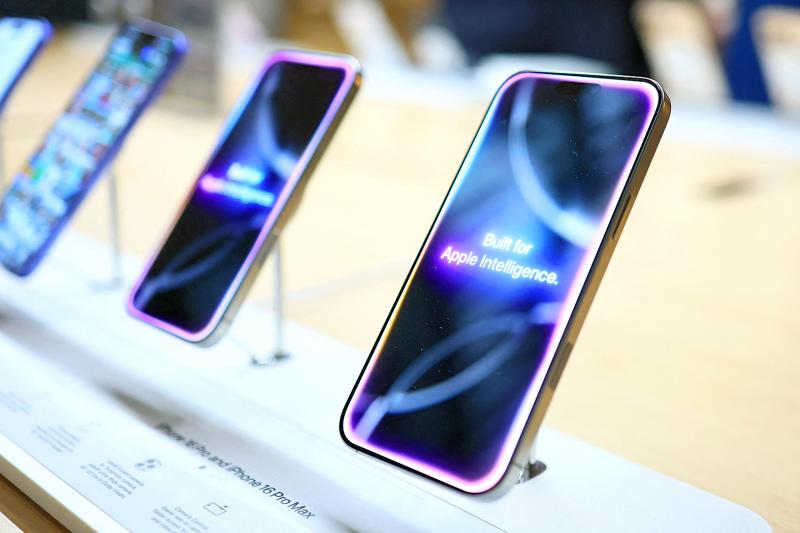US President Donald Trump’s administration exempted smartphones, computers and other electronics from its so-called reciprocal tariffs, potentially cushioning consumers from sticker shock while benefiting electronics giants including Apple Inc and Samsung Electronics Co.
The exclusions, published late on Friday by US Customs and Border Protection, narrow the scope of the levies by excluding the products from Trump’s 125 percent China tariff and his baseline 10 percent global tariff on nearly all other countries.
The exclusions would apply to smartphones, laptop computers, hard drives and computer processors and memory chips.

Photo: AFP
Those popular consumer electronics items generally are not made in the US. Setting up domestic manufacturing would take years.
The products that would not be subject to Trump’s new tariffs also include machines used to make semiconductors.
That would be important for Taiwan Semiconductor Manufacturing Co (TSMC, 台積電), which has announced a major new investment in the US, as well as other chipmakers.
The tariff reprieve may prove fleeting.
The exclusions stem from the initial order, which prevented extra tariffs on certain sectors from stacking cumulatively on top of the country-wide rates.
The exclusion is a sign that the products may soon be subject to a different tariff, albeit almost surely a lower one for China.
One such exclusion was for semiconductors, to which Trump has regularly pledged to apply a specific tariff.
He has not yet done so but the latest exclusions appear to correspond with that exemption.
Trump’s sectoral tariffs have so far been set at 25 percent, although it is not clear what his rate on semiconductors and related products would be.
The White House did not immediately respond to a request for comment.

A magnitude 5.6 earthquake struck off the coast of Yilan County at 12:37pm today, with clear shaking felt across much of northern Taiwan. There were no immediate reports of damage. The epicenter of the quake was 16.9km east-southeast of Yilan County Hall offshore at a depth of 66.8km, Central Weather Administration (CWA) data showed. The maximum intensity registered at a 4 in Yilan County’s Nanao Township (南澳) on Taiwan’s seven-tier scale. Other parts of Yilan, as well as certain areas of Hualien County, Taipei, New Taipei City, Taoyuan, Hsinchu County, Taichung and Miaoli County, recorded intensities of 3. Residents of Yilan County and Taipei received

Taiwan has secured another breakthrough in fruit exports, with jujubes, dragon fruit and lychees approved for shipment to the EU, the Ministry of Agriculture said yesterday. The Animal and Plant Health Inspection Agency on Thursday received formal notification of the approval from the EU, the ministry said, adding that the decision was expected to expand Taiwanese fruit producers’ access to high-end European markets. Taiwan exported 126 tonnes of lychees last year, valued at US$1.48 million, with Japan accounting for 102 tonnes. Other export destinations included New Zealand, Hong Kong, the US and Australia, ministry data showed. Jujube exports totaled 103 tonnes, valued at

BIG SPENDERS: Foreign investors bought the most Taiwan equities since 2005, signaling confidence that an AI boom would continue to benefit chipmakers Taiwan Semiconductor Manufacturing Co’s (TSMC, 台積電) market capitalization swelled to US$2 trillion for the first time following a 4.25 percent rally in its American depositary receipts (ADR) overnight, putting the world’s biggest contract chipmaker sixth on the list of the world’s biggest companies by market capitalization, just behind Amazon.com Inc. The site CompaniesMarketcap.com ranked TSMC ahead of Saudi Aramco and Meta Platforms Inc. The Taiwanese company’s ADRs on Tuesday surged to US$385.75 on the New York Stock Exchange, as strong demand for artificial intelligence (AI) applications led to chip supply constraints and boost revenue growth to record-breaking levels. Each TSMC ADR represents

TRUST: The KMT said it respected the US’ timing and considerations, and hoped it would continue to honor its commitments to helping Taiwan bolster its defenses and deterrence US President Donald Trump is delaying a multibillion-dollar arms sale to Taiwan to ensure his visit to Beijing is successful, a New York Times report said. The weapons sales package has stalled in the US Department of State, the report said, citing US officials it did not identify. The White House has told agencies not to push forward ahead of Trump’s meeting with Chinese President Xi Jinping (習近平), it said. The two last month held a phone call to discuss trade and geopolitical flashpoints ahead of the summit. Xi raised the Taiwan issue and urged the US to handle arms sales to